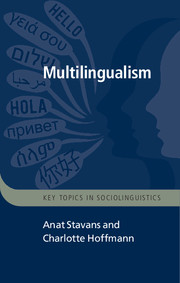Book contents
- Frontmatter
- Dedication
- Contents
- List of Figures and maps
- List of Tables
- Acknowledgements
- Introduction
- Part I Global and societal issues in multilingualism and trilingualism
- 1 Historical perspectives of language contact
- 2 Patterns of societal multilingualism
- 3 Old and new linguistic minorities
- 4 Globalisation, language spread and new multilingualisms
- Part II Construing individual multilingualism
- Glossary
- References
- Author index
- Places and languages index
- Subject index
4 - Globalisation, language spread and new multilingualisms
Published online by Cambridge University Press: 05 February 2015
- Frontmatter
- Dedication
- Contents
- List of Figures and maps
- List of Tables
- Acknowledgements
- Introduction
- Part I Global and societal issues in multilingualism and trilingualism
- 1 Historical perspectives of language contact
- 2 Patterns of societal multilingualism
- 3 Old and new linguistic minorities
- 4 Globalisation, language spread and new multilingualisms
- Part II Construing individual multilingualism
- Glossary
- References
- Author index
- Places and languages index
- Subject index
Summary
Postmodernity is the age of the multilingual speaker.
David Graddol (2006)Introduction
In Chapter 1 we took a historical perspective to language contact and much of the discussion entailed an examination of factors that had contributed towards the spread of certain languages in the past. For example, conquests, religious crusades and colonisation led to the establishment of languages such as Arabic in parts of Africa and Spanish in Central and South America. By the eighteenth century, a whole range of political, economic and social developments that had been set in motion earlier started to gather momentum, most notably large-scale migration, overseas trading in commodities and slaves, the establishment of overseas colonies and plantations, and the beginning of missionary activities, all of which were to have far-reaching linguistic consequences. English was transported around the globe, to America and the West Indies, to Africa, Australia, New Zealand and the Indian subcontinent, as well as many of the islands in the Pacific Ocean. Wherever it was taken, it added another sociolinguistic layer to an already highly multilingual linguistic landscape. Other European languages, too, were spread beyond Europe as a result of colonial practices, although their trajectories followed a different course than English. In many instances, indigenous languages became threatened and, of those that have been able to survive, many are today seriously endangered.
Postcolonialism brought new linguistic challenges to newly independent states. In most cases, these states were not in a position to shake off the linguistic legacy bequeathed by the former dominant powers, as there were persuasive political arguments in favour of maintaining an official position for the former colonial language. At the same time, there was also a strongly perceived need to promote one or more indigenous languages that would symbolise independent nationhood. Nowadays a disproportionately high percentage of foreign aid from former colonising countries continues to be given to former dependencies, which helps maintain linguistic ties.
- Type
- Chapter
- Information
- Multilingualism , pp. 93 - 132Publisher: Cambridge University PressPrint publication year: 2015
- 1
- Cited by

